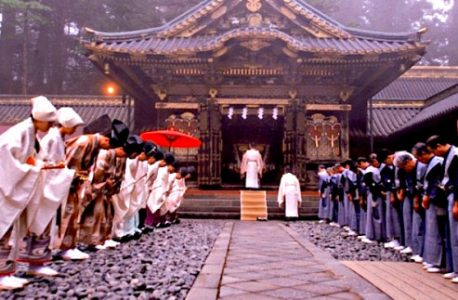The Japanese Emperor Akihito has officially abdicated his throne as of today (30 April 2019), I believe midnight tonight. As such he is the first Japanese emperor to abdicate in 200 years. His 30 year reign will be replaced by his son, Prince Naruhito, who will ascend the Chrysanthemum Throne on Wednesday ushering in a new era called Reiwa, which means the era of ‘beautiful harmony.’ And so, needless to say all day today the current emperor Akihito is performing a number of rituals, some public but most private, that involve properly abdicating the throne, announcing the abdication to the Shinto gods who guard and ultimately govern Japan in the traditionalist Japanese worldview. This really marks the end of an era. This emperor was the son of Hirohito, the emperor at the center of World War II in the pacific, and he was seen as a symbol of Japan’s re-birth; he was the first in the royal family to marry a commoner, a merchant’s daughter, quite wealthy of course, but not of royal blood. The marriage was seen as a gesture of brining the imperial family closer to the wider Japanese population, sort of descending from their pervious divine position to now being one of the people. In fact, my mother-in-law attended the same school as the empress, she was just a year or so behind her, and was actually one of her acquaintances. So that is kind of a couple second or third degree of separation for me there.
What really intrigued me in all of this is the role of the Japanese Emperor in a resurgent nationalist conservativism that is just been sweeping Japan’s governing elite. Japan is interesting because there really is a revitalized nationalism and rightwing conservatism in Japan, but not a populism, so much. It is not what we are seeing here in the West where our governing elites are all a bunch of globalist aristocrats who govern for their own advantage and not the advantage of the citizens of a nation, and have provoked a massive backlash among populations who are reasserting their nation’s customs, culture, and traditions as mechanisms of resistance against globalization and its secular aristocracy. That is not what is going on in Japan. Instead, in Japan, the ruling class is currently experiencing what is really nothing short of an astounding renaissance or revitalization of conservative nationalist rightwing sentiments that is sort of trickling down to the wider population. Japan IS indeed one of the nations going through a major nationalist surge, but it is not so much from the bottom up, from the people to the ballot box, as it were. It is more top down starting from the nation’s leaders to the people.
I have spent a lot of time in Japan. My wife was born and raised in Tokyo. We were married in Japan. I have family in Japan. I have studied the language and its culture and history. It really is an amazing country and an amazing people. What is so fascinating is the Emperor is really the link for the Japanese people to their past. You have to understand that the Emperor of Japan is a fully embodied symbol of the Japanese people and their history. In the Japanese imperial historical account, his lineage goes all the way back to the first emperor established by the Shinto gods back in the eighth or ninth century BC. That is during the times of Homer in Greece or just after Solomon in Israel Of course that is the idealistic account. Modern historiographers would place the first emperor at around the first century BC. Regardless, as you can see, we are talking about an astonishingly unbroken and intact imperial line that embodies the entire history of Japan and its people for over two thousand years. It is no surprising that the emperor has been the object of such veneration among not just the Japanese people but also the ruling elite.
Much has been made, in terms of news stories from our secular leftwing dominated media, of an organization known as Nippon Kaigi, which is translated as the Japan Conference. They are an organization of about 40 thousand members who are described as ultranationalist and far-right, radical-right. However, the Conference actually is an organization dedicated to the retraditionalization of Japan, at the heart of which is a revitalized imperial Shintoism that seems a renaissance of Japan’s historical traditions as the way forward in an increasingly globalized world. The current prime-minister Shinzo Abe is an advisor to the conservative organization, and, as I understand it, the vast majority of his cabinet were members of Nippon Kaigi. As a result, since 2012, Prime Minister Abe has been pushing policies that reflect a vibrant and revitalized Japanese nationalism that many nationalist populist leaders in the West are huge admirers of, particularly its immigration policies. In fact, Steve Bannon, Trump’s former campaign manager and chief strategist has called Prime Minister Abe a ‘Trump before Trump’ and a hero to nationalist populists everywhere. Leaders from the Alternative for Germany (AfD) have pointed to Japan’s immigration policy as the true alternative for Germany’s current open borders policy. In fact, Bannon sees Japan as the key 21st century Western ally to join forces against an expansionist Chinese Communist Party bent on turning more and more nations into serfs through giving them loans and economic aid that they could never hope to pay off.
Abe is dedicated to a ‘Japan First’ agenda that seeks to cultivate what he calls ‘a beautiful Japan’ that is strong and patriotic, which has overtones with the new emperor’s theme of Reiwa, the era of ‘beautiful harmony.’ Abe wants to see a Japan that is strong not just economically, but strong militaristically as well. He does have as his ultimate goal the revoking of Article 9 in the Japanese constitution that was written and forced by the United States after World War II. Japan of course does have an army, a self-defense force, but that are seen more as soldiers of peace, rather than any kind of invading army. They also contribute to United Nations forces as well. But Abe and Japanese nationalists want to change that in favor of their own sovereign military. I know that makes people nervous. But from what I can see, in my own experience, Japan has absolutely no intention or will whatsoever to even imagine wars of conquest at this point. Again, one of the most interesting things about the new nationalism emerging throughout the world is that it has almost universally renounced imperialism. This is largely because it sees globalization as so horrifically guilty of imperialism, of imposing a one-size-fits-all political and economic system on all nations, cultures, customs, and traditions. So the new nationalism tends to be highly allergic to anything even remotely resembling conquest and imperialism. It appears that Japan would concur. Right now, Japanese nationalism appears to simply want its unique Japanese identity back, which they feel they have lost largely through adopting corporatist globalization which by its nature erodes customs, cultures, and traditions through a two-fold process known as disembedding and detraditionalization. It appears quite clear that those anti-cultural days are over and that Japan’s governing elites are indeed turning back to nation, culture, custom, and tradition as the way forwards in the 21st century.

